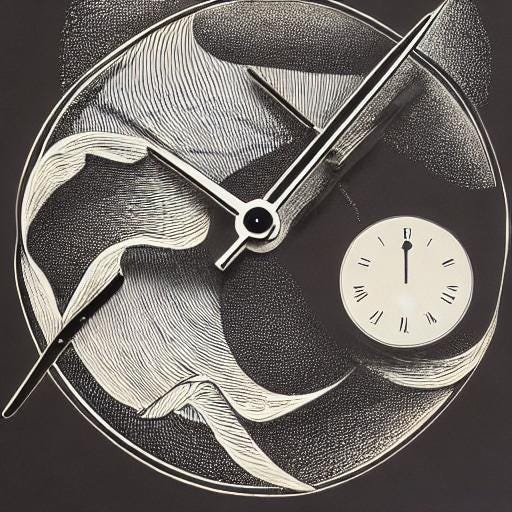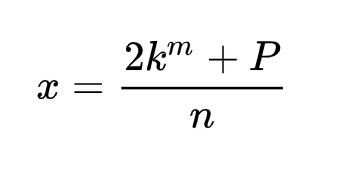⏱️ Read time: 5 mins (grab some coffee)(Read this on the web browser if you prefer)
Hey beautiful people!
Another week has passed and I rate it a 8 out of 10.
Regular workouts, healthy meals, decent writing.
I’m feeling productive and on a nice path to achieving many goals. 💪
I hope you’re feeling the same, but if you’re not, maybe this can help.
⤵️⤵️⤵️
🧽 What I’m Soaking In
Work expands so as to fill the time available for its completion.
-Parkinson’s law (Cyril Northcote Parkinson)
I've had this quote printed on a strip of paper and taped to my computer screen for over 10 years, reminding me that I don’t need to work after hours (and by “me” I mean the several bosses I had throughout the years).
When it was first published in the 1950s, this law explained through a mathematical equation how bureaucracies expand over time:
Pretty simple, right? Basically, Bureaucracy (x) equals 2 times Greed (K) raised to the power of Laziness (m), plus Soul-Crushing Labor Years (P), all divided by God Knows What Actually Got Done (n).
Crystal clear, right?
Despite originally showing us that we should all praise greed and laziness for leading to higher employability rates and nerve-racking inefficiencies, nowadays Parkinson's law is commonly applied to other fields, including economics, computer science, and management.
Like most people, I apply it to personal time management, where this law translates into the idea that defining a long period of time to complete an otherwise simple task will complicate it.
Ok, but how is this helpful?
Well, by applying ultra-complex formulas of reverse engineering, we can conclude that if a task expands to fill the big slot of time we allocated to it, maybe if we reduce that time slot we can complete the same task in… you guess it, less time!
Constricting the timeframe will simplify our perception of the task and force us to avoid procrastination and unnecessary overthinking, allowing us to complete it much sooner, saving us precious hours that we can spend binge-watching the complete Star Wars Saga. This reminds me:
May the 5th be with you, my dear Jedi reader (don’t blame me for this failed joke, blame my scheduling decisions).
What we can learn from this is that we’re capable of doing much more stuff than what we sometimes believe we do. We can cut imposed deadlines in half and still do the job, or if the deadlines are imposed by ourselves, we can be much more ambitious and set shorter deadlines than we used to.
Using this newsletter as an example, I supposedly have one week to write, edit, and publish the edition on Sunday, but usually what happens is that I get to Saturday with only 15% of the job done.
What if I set the deadline to Wednesday? That will make me work much faster and more focused, resulting in better work at the end.
Here is a full list of tips to do this:
Shorten deadlines set by others (and embrace them, even when talking to other people)
Set ambitious deadlines for your projects and divide them into smaller tasks if needed, with short deadlines each.
Time block periods that comply with the designated deadlines, and be a savage when it comes to sticking to them
Be flexible enough to adjust the course if necessary, but still rigid about the idea that work fits the amount of time we give to its completion. Don’t go extreme on an unhealthy working routine, but embrace the idea that you can do more in less time
I'm sure we've all experienced this law in practice, whether with academic work where we had an entire semester to complete it but only really started it the day before, or when we just sit down to watch a video on YouTube after lunch and the next thing we know, the whole afternoon has passed and your wife is getting home in 5 minutes and you still haven't cleaned the house as you promised 3 times already that week. This house will be a stunner when she arrives, amirite!?
This only proves that we can produce the same amount of work in less time, we just need to be conscious about it.
Apply this gradually and let me know the results.
💣 Recommendations
My friend Tommy just dropped another bomb on his Substack.
After reading it I understood better why he’s such a great writer. It also made me realize that opposite premisses can sometimes lead to the same kinds of results.
This story has the length that it should have, so I recommend a refill of your coffee.
Another friend of mine, Jack, debuted on Substack last week, and if you’re someone who eats every now and then, you should follow him.
Feed your body, mind, and soul with his fulfilling stories.
📚 Books
I’ve been reading Million Dollar Weekend by Noah Kagan, and I can see why it is a bestseller. Noah Kagan is really an action-taker, and this is a no-fluff book.
I’ve been also listening to Leonardo da Vinci by Walter Isaacson, and so far what surprised me most was that da Vinci was not only a brilliant artist, but also a world-class marketer. In a letter to the ruler of Milan listing the reasons he should be given a job, he first mentioned 10 areas of expertise that were of the most interest to the ruler of a big city, from designing bridges and waterways to cannons and armored vehicles, not forgetting public buildings. Only in the 11th paragraph did he mention that he was also an artist:
Likewise in painting, I can do everything possible.
- Leonardo da Vinci
Often the way to get what we want from others is by suppressing their needs first.
🏁Finish Line
That’s all for this week.
I hope you’ve enjoyed this, and I dare you to do twice as much in half the time this next week.
Don’t forget to tell me how it went!
-Danny








